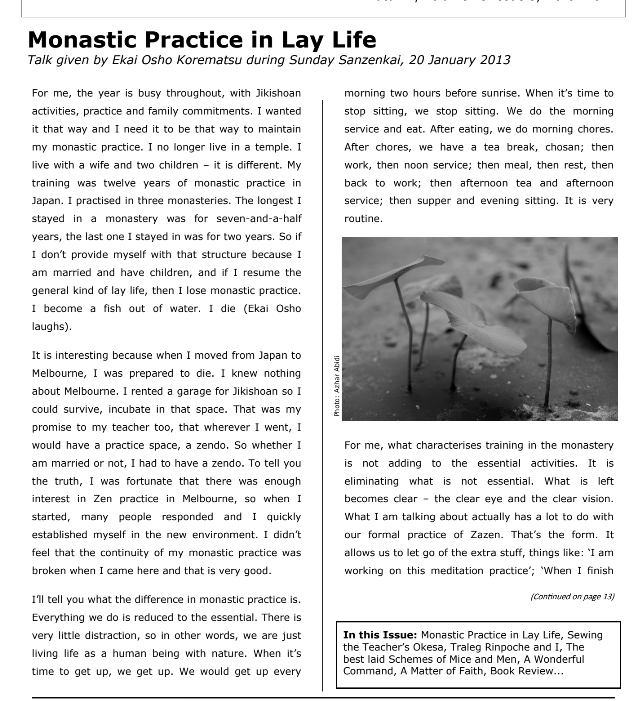Editorial
This Myoju’s theme is ‘Zen in Everyday Life’. It raises some interesting questions about our definition of Zen practice and our ideas of integrating it into everyday life.
John Wardell’s review of Zen at Work, a book by Les Kaye, says that work is our practice. We can go further and say that our whole life is practice and intellectually, that is very true, but Ekai Osho points out in his Dharma talk, ‘Monastic Practice in Lay Life’, that if we are not careful, then our practice can just become a label for our own desires and wishful thinking. To integrate Zen into everyday life without our own ideas about it, we need guidance. The best possible guidance is to participate in the activities of the Jikishoan Zen Buddhist Community. The community offers many formal opportunities of practice outside the zendo. By becoming a member of the Committee of Management or by committing to work in one of the various ryos, students can practise everyday activities in a supportive environment, with the counsel of Ekai Osho and the mentoring of senior students. Through this kind of training and through the practice-experience, Ekai Osho says, we begin to eliminate what is not essential, and what is left starts to become clear. What is left is seeing things as they are. This process can be confronting and that comes through in several contributions here.
Lee-Anne talks about the experience of just having to deal with a word–faith–and re-aligning her understanding and ideas associated with it.
Vaughan Behncke gives a humbling account of how difficult he found things when his plans for last year came undone.
We also have a wonderful feature based on Kal Kingi’s talk from last September, where he talks about his role at the Kagyu E-Vam Buddhist Institute and how he managed things after Traleg Rinpoche passed away.
Thanks to all contributors to this issue of Myoju, and a special thank–you to the members of the publications group who work behind the scenes to produce it. We hope you enjoy reading our first edition of Myoju for 2014.
Azhar Abidi
On behalf of Ekai Korematsu–Editor, and the Jikishoan Publication Committee

